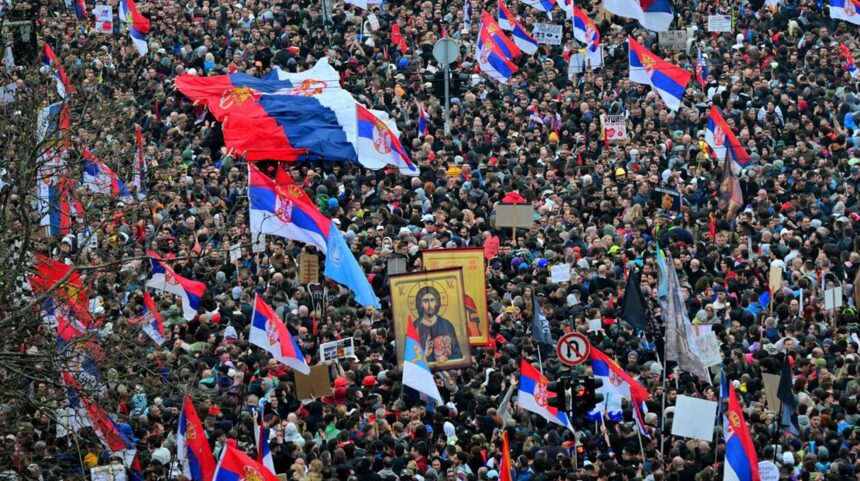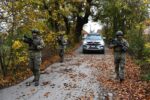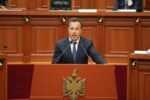For a year now, Serbia has gone from mourning the lives lost in the collapse of the railway station roof in Novi Sad to nationwide protests demanding the resignation of President Aleksandar Vučić.
However, protesters across Serbia have gone far beyond the initial reasons for the demonstrations, turning increasingly to anti-Albanian rhetoric.
“Aco šiptare” (“Let’s get the Albanians”) has become one of the favorite chants of protesters making ultranationalist calls — urging Serbs to unite in spreading anti-Albanian political messages.
Among other things, the demonstrators repeatedly shout “shiptari,” a derogatory term for Albanians, and the ever-present illusion: “Kosovo is Serbia.”
Protests as a Sign of Discontent with the Government
With the Serbian opposition now siding with the protesters, they have used the opportunity to promote their own anti-Vučić agenda.
The Mayor of Preševo, Ardita Sinani, told IndeksOnline that the escalation of massive protests and the growing anger toward Serbia’s autocratic government have reached their peak in recent months.
The same view is shared by the well-known Albanian journalist in Serbia, Ardita Behluli.
Anti-Albanian Chants and the Safety of Albanians in the Preševo Valley
Both Sinani and Behluli emphasized that the spread of anti-Albanian slogans poses an increasing threat to Albanians in Preševo, Medveđa, and Bujanoc.
“There are documented cases and videos showing offensive language and chants against Albanians and Kosovo — not only at protests but also at stadiums and other gatherings.
These include the use of the slur ‘shiptari’ and chants like ‘Kosovo is Serbia’ in provocative ways.
Such rhetoric is nationalist, discriminatory, unacceptable, and risks inciting hatred and violence.
They often come from ultranationalist or radicalized groups using conflict to strengthen political messages,” said Behluli.
On the other hand, Mayor Sinani pointed out that the anti-Albanian agenda has long been promoted — not only through protests but also via state and public institutions in the Valley.
“Since the arrival of SNS and Vučić — first as prime minister, then as president — discrimination and violations of rights, especially against the Albanian minority, have only increased.
These violations have been consistent even under previous governments that tried to appear ‘democratic’,” she said.
Sinani added that the recent protests have further revealed Serbia’s deeply ingrained anti-Albanian climate.
“For Albanians in the Valley, the current opposition is no different from those in power.
We’ve realized that when it comes to hatred toward Albanians and the dream of ‘returning Kosovo to Serbia,’ opposition and government are as identical as one egg to another,” she said.
Denial of Discrimination Against Albanians
The 2025 European Commission Progress Report also identified discrimination against Albanians in Serbia.
This issue was also raised by Kosovo’s Deputy Prime Minister, Besnik Bislimi, who has repeatedly highlighted it in Kosovo-Serbia dialogue discussions.
“Violations of Albanians’ rights in Serbia have also been noted by the European Union.
The 2025 European Commission Report confirms that Belgrade continues to fail in respecting the rights of national minorities, including Albanians in Preševo, Bujanoc, and Medveđa.
The report stresses that the institutional framework for minority protection remains incomplete, and Albanians continue to face discrimination, underrepresentation, and address deactivation.
These practices are part of policies aiming for ethnic cleansing of Albanians through administrative means,” Bislimi stated.
Serbia has so far remained silent on the issue of address deactivation, which Sinani calls an arrogant policy of Vučić’s regime.
“Rising unemployment, the exclusion of Albanians from public institutions in Preševo, Medveđa, and Bujanoc, and the selective deactivation of addresses — especially in recent years — have characterized Vučić’s governance and SNS’s policy toward Albanians,” said Sinani.
She also emphasized that the alignment of the opposition with protesters shows they are just as hostile toward Albanians as the government in power.
Media Silence and Politicization
Journalist Behluli sees media politicization as the main reason why discrimination against Albanians in Serbia is rarely discussed.
“In an environment where nationalism is widespread, offensive comments are often treated as ‘normal protests’ rather than threats to minority communities.
Pro-government media or those owned by nationalistic elites tend to minimize or relativize the issue.
Independent journalists feel pressure and insecurity when reporting on hate-related incidents.
International media and local organizations have also criticized this lack of open debate,” Behluli concluded.







